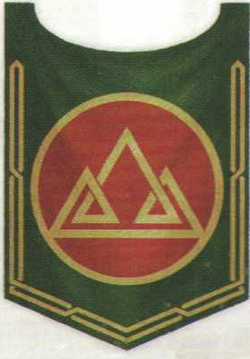Karaz-a-Karak, which translates roughly as "Everpeak," or the "Pinnacle of Mountain" in the Dwarf tongue, is the capital city of the Dwarf race, and High King Thorgrim Grudgebearer's seat of power. This is the mightiest and most populous of all Dwarf cities, the capital of their kingdom of Karaz Ankor and the stronghold of the Dwarf High King.
Here, amongst its ancient temples to the Ancestor Gods, High King Thorgrim Grudgebearer holds court in a vaulted Great Hall large enough to engulf a Human town. The forest of pillars that form the mile-long nave of the hall tower high into darkness. Despite suffering attacks beyond number, Karaz-a-Karak has never fallen to an invader.
Here are kept the Great Book of Grudges, the Book of Remembering and countless hoarded treasures, each an object of awe and veneration to any Dwarf.
After a great deal of bluster and grumbling, even the most independent of Dwarfs from one of the far-off holds will ultimately admit to a fierce pride of Karaz-a-Karak. Although their empire may have crumbled, here at the stony heart of their realm, its power and splendour endure.
Structure[]
Karaz-a-Karak is the largest of the Dwarf Holds and is one of the most magnificent architectural structures in the Known World. Hidden from view by a winding pass that cuts its way through the Worlds Edge Mountains, as you round yet another outcrop on your long trek through the steep treacherous pass the full splendour of the gates of Karaz-a-Karak suddenly looms before you. The sheer size of the gates will take your breath away. Standing at over four hundred feet tall, the gates appear to be carved into the mountainside.
A solid flat bastion of stone reaches up to embrace the clouds and if you turn your head towards the sky you can just make out the glint of a multitude of squat, armoured figures patrolling the upper wall. Carved into the gate is the symbol of Valaya, the Dwarf Ancestor Goddess. Her image on the gates is said to protect the city from harm and evil magics.

The banner of Karaz-a-Karak
No visitor ever approaches Karaz-a-Karak unannounced. Miles before even a lone traveller reaches the gates their progress will have been spied by the many hidden watch posts that overlook the Everpeak Pass. A lone Dwarf in full clan regalia will await them on their arrival. He bears the title of "gatekeeper" and it is to him and him alone that a newcomer must state their business.
Few these days indeed are allowed access to the great Dwarfen city. Once, the gates stood open to all visitors and the Dwarf race was more than welcoming to strangers in their realm. Years of war and devastation have changed that forever and now they do not encourage contact with the other mortal races.
Should a visitor have a good reason, and a very good reason only, to enter the kingdom of Karaz-a-Karak, the gatekeeper will knock rhythmically on the door five times with his intricately carved rune hammer, then trace the sign of a secret rune into its flat surface. Silvery seams once invisible to even the closest inspection of the smooth granite surface suddenly appear. Seemingly from out of nowhere a doorway no more than four feet high and three feet wide opens.
It has been many centuries since the high king gave instruction to a gatekeeper to open the main gates. In the year following the terrible earthquake that shook many of the Dwarf realms to their very foundations, Morgrim Ironbeard, the high king at the time, ordered the gates to be closed.
This dour period of Dwarf history is known as the "Time of Woes." Many of the Dwarf strongholds were under attack from hordes of Greenskins and Skaven that flooded out from the caverns to take advantage of the devastation that the earthquake had unleashed on the Dwarfs.
In his wisdom, the king shut off access to the great city. In doing so he also shut off the Dwarfs from contact with the outside world and it has remained much this way to the current day. The gates are only opened to allow the high king's army to march to war.
In the rare event that this happens, the gates are opened in silence with no ceremony. Dwarfs do not celebrate war and a Dwarf army on the march from Karaz-a-Karak. Whilst a sight to behold, it is a solemn affair.

Banner bearing the Dwarf rune that symbolizes Karaz-a-Karak
The gates of the city have only ever been besieged twice in its long history and both times the besiegers have been forced to abandon their attempts. Even the largest of the great war machines that the Orc Warlord Ugrok Beard Burner brought to bear on the gate barely caused an indentation into the thick stone.
The Orc Warlord himself realised the futility of trying to break down the gate with the giant battering ram he had constructed, and the Dwarfs sallied forth and destroyed his horde as he lifted the siege.
It is said that amongst the defences of the city are great rivers of molten lava that can be poured from the mouths of the carved stone dragons that sit atop the upper wall of the gate. Also, it is claimed that the hills around the approach to the gates are filled with powerful steam engines, which can cause avalanches and rockslides, and even drop lengths of the path into hidden chasms and crevasses.
All Dwarfs hold hope in their hearts that one day the giant gate of the great stronghold will open once more and that fine Dwarf craftsmanship will once again be available to trade across the world. Until that day, the Dwarfs continue to remain safely protected from the outside world, behind the stone fortress that protects their great subterranean city.
Sources[]
- Warhammer Armies: Dwarfs (6th Edition), pg. 58
- Warhammer Armies: Dwarfs (7th Edition), pg. 25





